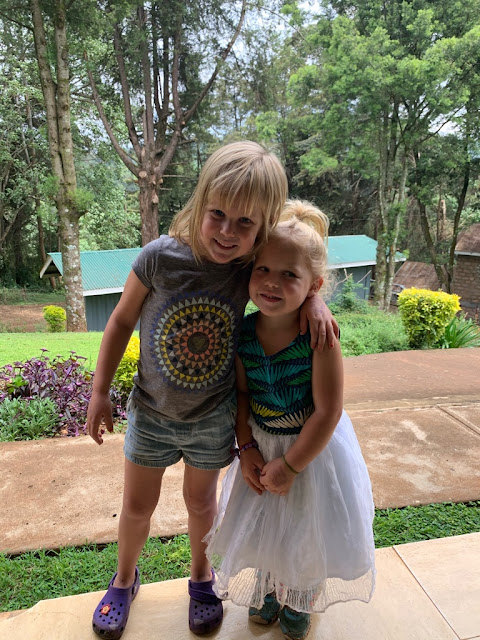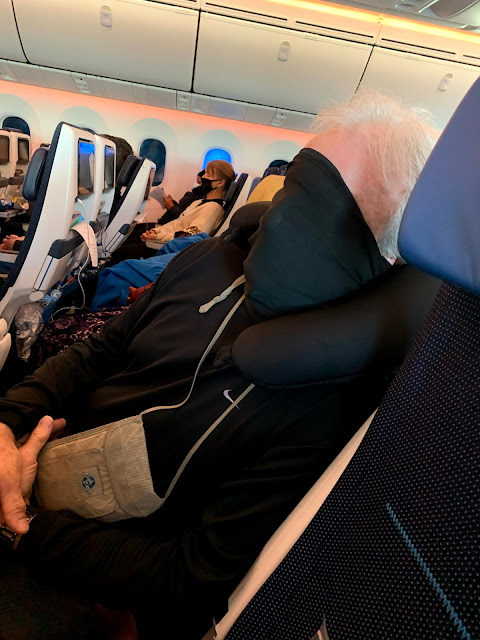Greetings friends,
Perhaps many of you will not read past the title this
week…who needs more despair in their life…I certainly don’t, and I bet you
don’t either. Nonetheless, it’s a theme
that I have become aware of this first week here at Tenwek. Just a little background for perspective…
when we arrived here about a week ago, a national doctors strike and nurses
strike was just ending…it had apparently been going on for about a month prior
to our arrival. The back story is that
one of the national Kenyan physicians, about 25 yrs or age, had not been paid
for 4-5 months prior to coming down with COVID 19. He became very ill, and ultimately died at
one of the large national hospitals. The
hospital (with Kenyan government backing) decided to charge the doctor’s family
his entire hospital bill, despite not having paid him his salary for many
months prior. This apparently was the
final straw… a national doctor’s strike followed over pay concerns, inadequate
facilities, and inadequate PPE (personal protective equipment). Since Tenwek
Hospital is a private, faith-based facility, and the medical staff and nurses
are not paid by the Kenyan government, it was one of the few facilities in the
country still open for business.
Consequently, Tenwek had been severely stressed with an influx of
patients above and beyond their norm.
For example, the OB service would sometimes have more than one laboring
patient in a single bed (2-3 patients per bed at times depending on the
need). The medical service has had all
ICU and HDU (critical care) beds full, and an additional 6-10 critical patients
backed up in casualty (the emergency department) waiting for a bed to become
available (which either means someone dies and the bed becomes empty, or
someone improves and can be moved out to the floor…sadly, the former occurs
almost as often as the latter). In
addition to the unusually heavy patient load, there has been a relative paucity
of short term volunteers since the onset of the pandemic. We have been some of the earliest “returnees”
this past year, and as expected many of the long term staff appear to be
experiencing various levels of “burnout”.
I expected to see this among the long term staff, but was not expecting
to see an overall increase in apparent despair among the patient population? After all, their individual situations are
already quite dire for the most part, so I did not think that there would be much
distress about the pandemic. I expected
that they would perceive this as just another potential infection to avoid…and
not even a particularly scary one compared with HIV, TB, Bacterial meningitis,
etc (which are much more common and more deadly). But something IS different among the patients
this year…it was even brought to my attention by the long term attending
medical staff. They reported seeing many
more suicide attempts than in past years (usually by way of ingesting a poison
of various types). The patients around
Tenwek are mostly farmers and have livestock, and as a result have access to
many pesticides and herbicides. A common
poisoning might consist of an organophosphate (an herbicide) or triatix (an
anti- tick medication for their farm animals), or some home- brew alcohol… most
times, some combination of the above. If
they survive the poisoning attempt, we would then typically question them about
what brought them to the point of wanting to end their lives. Invariably, their answer has been some sort
of conflict within their interpersonal relations with family or loved ones or
inability to work. So why the increase
this year? Similar to what we are seeing
in the U.S. this past year, the Kenyans have also been masking, attempting to
socially distance themselves from others, avoiding large gatherings like
worship services. We walked by the Thursday
night worship service up at the hospital chapel last evening and noted less
than half the usual attendance compared with previous visits. As in the US, the
holiday times are also particularly bad for depression, despair, and suicide
attempts. In addition to the above, I
see signs that some of most steadfast long term missionaries are suffering as
well. For example, the chief of my
medical service who has been in Kenya for many years recently posted a long
essay on Facebook about his disillusionment with the “goodness” of America –
particularly from the Vietnam era forward.
This is very out of character from what I know of him. He has always been a very upbeat, spiritual
person…. very trusting in the goodness and sovereignty of God, and yet he seems
to be feeling some sense of hopeless despair at the state of our nation, and
the diminishing “goodness” among our leaders and our people. Marilyn and I have also been discussing the
despair and sense of hopelessness that we feel about our nation and our citizenry. We have been progressively concerned that
many of our fellow citizens feel the same …a sense that all civility and
decency are disappearing; a concern that justice and fairness are no longer
goals of too many Americans; a sense that our leaders and our political parties
will do anything to accomplish their goals regardless of the harm that it does
to the nation. I personally no longer
trust our political parties, or our news media.
I find that I am likewise losing faith in our courts and justice
system. I no longer trust my fellow man
to pursue, or even to desire to know objective truth or justice if it does not
serve their own purpose. I even find myself
questioning some medical science and research, since everything seems to have
become politicized…we are beginning to see reports of some medical research
being falsified and corrupted by apparently preconceived desires for certain
outcomes. I know from talking with
Kenyans that many of them are also distrustful of their corrupt leaders and
institutions. Perhaps what we are
witnessing both here in Kenya, and also at home in the U.S. are the very real
and harmful effects of isolation, fractured relationships with friends and
loved ones, a sense of distrust and betrayal by our institutions, our media,
and our fellow man… and a progressive distancing of ourselves from God. After all who is truly “good” (Mark
10:18 “And Jesus said to him, “why do
you call me good? No one is good except
God alone.”)? How did we get here? How do we get out of this? How do we regain trust that has been broken or
lost? How do we avoid despair in the
face of all this? Unfortunately, I think
the answer is that we don’t “get out of this” in this lifetime…we live in a
fallen, broken world with fallen broken people and institutions. If our trust is in these things, we are bound
to be disappointed and hurt. Our only
hope is to place our faith in the One who IS good… “…God alone”. And yet in the midst of all that there is to
be sad about, every now and then we catch a glimpse of a spark of light in the
darkness. On Wednesday of this week I
was asked to give a talk to the medical students for their noon luncheon. In preparation for this, I attempted to
charge up my laptop the night before…as I plugged in my charging cable, there
was a sudden spark and a burning smell which spelled doom for my efforts. Facing the possibility that I might not have
enough battery power to complete my talk, I went into what I thought was the IT
office at the hospital, hoping that they might have a spare cable for an Apple
computer. What I actually did, was walk
into the finance department and begin to tell my sad tale to the office worker
there. He listened politely, and then
informed me I was in the wrong office.
Instead of sending me on my way, he offered to take my charger and “ask
around” to see what could be done. He
promised to call me back that evening.
Needless to say I was skeptical that I would hear from him again, and
even less skeptical that there would be any “asking around”. To my amazement, he called me back at about
7:30 PM to tell me that he had located a receptionist in the Eye clinic, who
had such a cable, and would be willing to loan it to me!...who would have
believed that a random individual in the “wrong department” would go out of his
way to help me with my inconsequential problem.
Additionally, who would be willing to trust a random stranger with a
critical piece of such equipment – Winnie, the Eye clinic receptionist, informed
me that she would need her charging cable back for her own use the next day…she had an upcoming
test that she needed to access by computer!
What a world we live in… what “goodness” we still encounter in the
strangest places! Perhaps that’s the
answer to our human condition: take personal action and responsibility where we can; be kind in the smallest of encounters; be honest
with others; help where you can; keep your promises; trust in God and His
goodness. I find that small encounters like this keep me encouraged in spite of all that is wrong with our fallen world...what about you?
Psalm 42:5 “Why are
you cast down, O my soul, and why are you in turmoil within me? Hope in God: for I shall again praise him, my
salvation.”
Romans 15: 13 “May
the God of hope fill you with all joy and peace in believing, so that by the
power or the Holy Spirit you may abound in hope.”


























